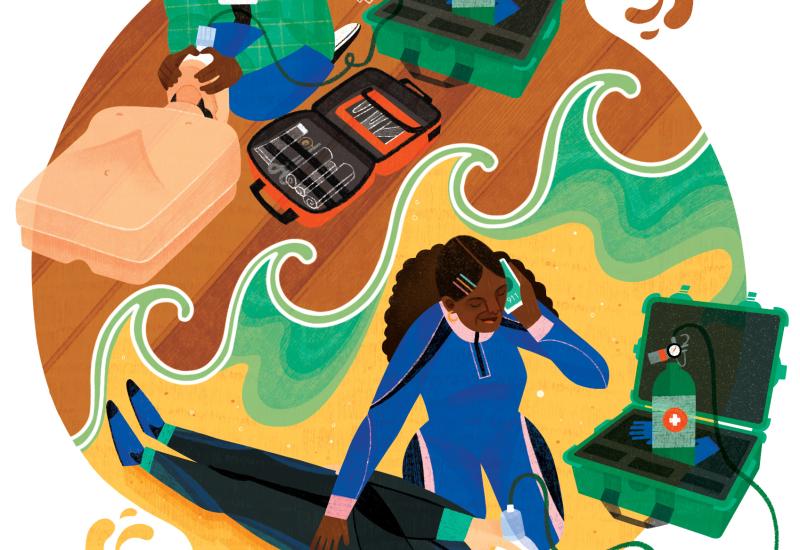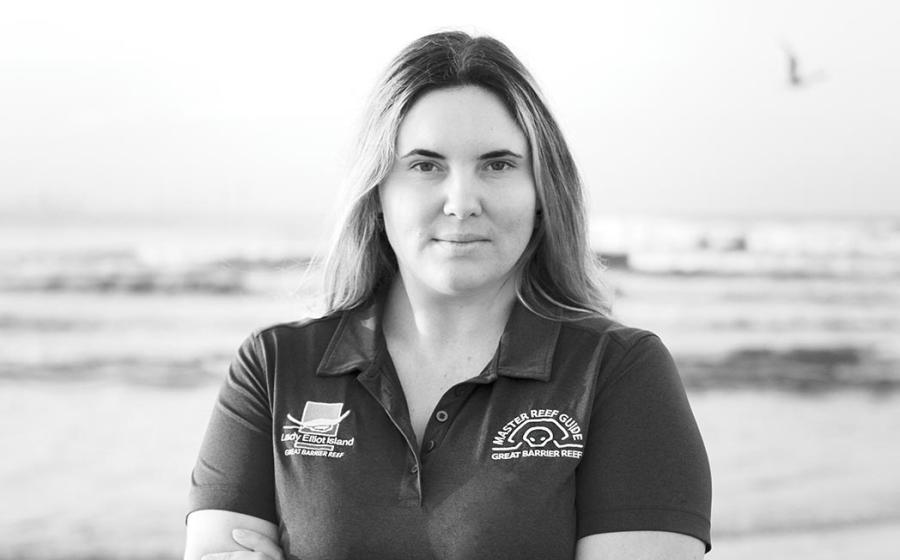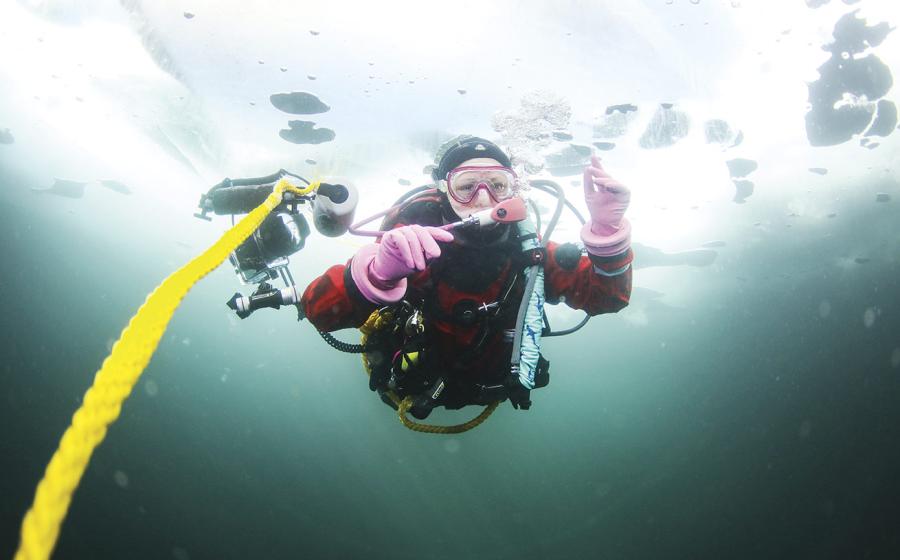Scuba Diving With a Cold
October 2003
By Selene Yeager
After months of gleefully ticking off the days like an antsy schoolkid before summer break, you finally arrive at Sunshine Cay, and your nose is flowing like Captain Morgan at Mallory Square. The stress of travel depresses immunity and leaves you vulnerable to sniffles and sneezes.
Most docs give an immediate "no dice" to the question of diving with a cold. But that auto-reply overlooks the fact that there are ways to manage your symptoms--provided they aren't too severe--and salvage your vacation.
The first thing to remember when your nasal passages are as congested as the New Jersey Turnpike in July is that not every runny nose is a cold. "In an airplane cabin, you're breathing recirculated air that is heavy in mold and mildew," explains Captain Marie Knafelc, M.D., Ph.D, who has performed almost 20 years of diving research for the Navy. "Even if you're not typically allergic to such things, being exposed to a high concentration of allergens during a flight can trigger a reaction in anyone. Also, when you go to altitude, your body fluids shift and you become dehydrated, which exacerbates the condition."
If you're just feeling stuffed-up, consider kicking back and giving your body a chance to clear itself and bounce back, suggests Knafelc. If you do a self-assessment and you have persistent or worsening congestion and any other symptoms, you should consider yourself sick. Then the question is whether you're too sick to dive. A relentlessly blocked-up head is unsafe for scuba. You won't be able to clear your ears and sinuses while descending. Worse, at the end of your dive, it elevates your risk for a reverse squeeze on your way back up.
A forehead that feels like a plate of steamers is another no-dive symptom, says Knafelc. Fever speeds your body's metabolism, causing you to burn through your tank more quickly. A high temperature also clouds your thinking and makes you slow on your fins.
Other signs to stay ashore: Coughing and rattling chest congestion. Excess mucus in your lungs not only makes it tough to breathe and increases the stress on your body, but it also heightens your risk for a potentially fatal arterial gas embolism (AGE) should air get trapped behind a glob of mucus in your lungs. At best, you will be miserable as the cold, dry compressed air you're breathing triggers underwater coughing jags. Ditto for a bad sore throat. A little scratchiness is OK, but if you're struggling to swallow, cancel the dive.
Dive Savers
Serious symptoms aside, you probably don't have to abort your dive over a case of the sniffles. There are a number of low-side-effect drugs you can take to relieve your symptoms safely and effectively, says dive enthusiast and researcher Simone Taylor, PharmD. "It's important that you have experience with any drug before you dive on it." Sudafed (pseudoephedrine), is a decongestant that shrinks inflamed membranes that line your nose and sinuses. "Most divers can take Sudafed safely," says Taylor. "A few people do experience increased heart rate, and some score higher on anxiety tests after taking it. So in a dive situation where everything is not going quite to plan, it can predispose those people to problems." The same goes for Dimetapp and Afrin, other popular decongestants. When using a decongestant, be sure to choose a long-lasting, 12-hour formula, so you can be sure it won't wear off and set you up for reverse block mid-dive. Also give your decongestant ample time to kick in.
Another good choice for stubborn sinus inflammation is Flonase, says Knafelc. "It's only available by prescription, but it can be taken once or twice a day and is very effective." The benefit of Flonase is you can use it a few days in a row without worrying about "rebound," where your congestion actually worsens instead of improves.
For allergy-related congestion, most new-generation antihistamines, like Claritin, are considered safe for scuba. "Just read the labels and avoid Benadryl and other preparations that can leave you feeling drowsy," says Taylor.
How Sick Is Too Sick?
You should be able to answer "yes" to each question. If you can't, skip the dive.
-
Can you breathe easily through each nostril?
-
Have you gone at least two hours without having to blow your nose?
-
Can you equalize your ears easily on land?
-
Has it been at least a day since you have had fever, chills or sweats?
-
If someone asked you to do some other physical activity, would you feel up to it?
-
Have you gone at least two hours without coughing?
-
Will your medicine last at least two hours after the dive ends?
After months of gleefully ticking off the days like an antsy schoolkid before summer break, you finally arrive at Sunshine Cay, and your nose is flowing like Captain Morgan at Mallory Square. The stress of travel depresses immunity and leaves you vulnerable to sniffles and sneezes.
Most docs give an immediate "no dice" to the question of diving with a cold. But that auto-reply overlooks the fact that there are ways to manage your symptoms--provided they aren't too severe--and salvage your vacation.
The first thing to remember when your nasal passages are as congested as the New Jersey Turnpike in July is that not every runny nose is a cold. "In an airplane cabin, you're breathing recirculated air that is heavy in mold and mildew," explains Captain Marie Knafelc, M.D., Ph.D, who has performed almost 20 years of diving research for the Navy. "Even if you're not typically allergic to such things, being exposed to a high concentration of allergens during a flight can trigger a reaction in anyone. Also, when you go to altitude, your body fluids shift and you become dehydrated, which exacerbates the condition."
If you're just feeling stuffed-up, consider kicking back and giving your body a chance to clear itself and bounce back, suggests Knafelc. If you do a self-assessment and you have persistent or worsening congestion and any other symptoms, you should consider yourself sick. Then the question is whether you're too sick to dive. A relentlessly blocked-up head is unsafe for scuba. You won't be able to clear your ears and sinuses while descending. Worse, at the end of your dive, it elevates your risk for a reverse squeeze on your way back up.
A forehead that feels like a plate of steamers is another no-dive symptom, says Knafelc. Fever speeds your body's metabolism, causing you to burn through your tank more quickly. A high temperature also clouds your thinking and makes you slow on your fins.
Other signs to stay ashore: Coughing and rattling chest congestion. Excess mucus in your lungs not only makes it tough to breathe and increases the stress on your body, but it also heightens your risk for a potentially fatal arterial gas embolism (AGE) should air get trapped behind a glob of mucus in your lungs. At best, you will be miserable as the cold, dry compressed air you're breathing triggers underwater coughing jags. Ditto for a bad sore throat. A little scratchiness is OK, but if you're struggling to swallow, cancel the dive.
Dive Savers
Serious symptoms aside, you probably don't have to abort your dive over a case of the sniffles. There are a number of low-side-effect drugs you can take to relieve your symptoms safely and effectively, says dive enthusiast and researcher Simone Taylor, PharmD. "It's important that you have experience with any drug before you dive on it." Sudafed (pseudoephedrine), is a decongestant that shrinks inflamed membranes that line your nose and sinuses. "Most divers can take Sudafed safely," says Taylor. "A few people do experience increased heart rate, and some score higher on anxiety tests after taking it. So in a dive situation where everything is not going quite to plan, it can predispose those people to problems." The same goes for Dimetapp and Afrin, other popular decongestants. When using a decongestant, be sure to choose a long-lasting, 12-hour formula, so you can be sure it won't wear off and set you up for reverse block mid-dive. Also give your decongestant ample time to kick in.
Another good choice for stubborn sinus inflammation is Flonase, says Knafelc. "It's only available by prescription, but it can be taken once or twice a day and is very effective." The benefit of Flonase is you can use it a few days in a row without worrying about "rebound," where your congestion actually worsens instead of improves.
For allergy-related congestion, most new-generation antihistamines, like Claritin, are considered safe for scuba. "Just read the labels and avoid Benadryl and other preparations that can leave you feeling drowsy," says Taylor.
How Sick Is Too Sick?
You should be able to answer "yes" to each question. If you can't, skip the dive.
Can you breathe easily through each nostril?
Have you gone at least two hours without having to blow your nose?
Can you equalize your ears easily on land?
Has it been at least a day since you have had fever, chills or sweats?
If someone asked you to do some other physical activity, would you feel up to it?
Have you gone at least two hours without coughing?
Will your medicine last at least two hours after the dive ends?










